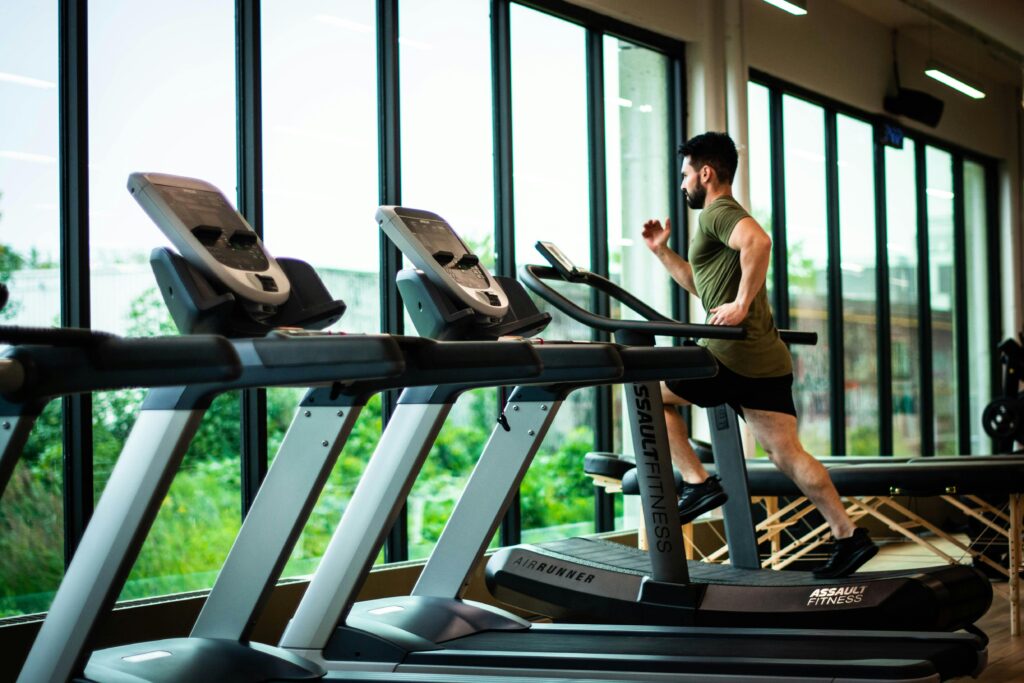Many of us reach for coffee when fatigue hits, relying on caffeine for that quick energy boost to power through our day. However, while coffee provides a temporary solution, it often leads to jitters, anxiety, disrupted sleep, and the inevitable energy crash. The good news is that there are numerous evidence-based, caffeine-free alternatives to maintain steady energy levels throughout your day. This comprehensive guide explores seven habits that can naturally enhance your energy without the downsides of caffeine dependence.
Regular Physical Activity
Exercise might seem counterintuitive when you’re already tired, but it’s actually one of the most effective natural energy boosters available. Physical activity improves your body’s energy production systems at the cellular level.

Photo by on Pexels
How Exercise Enhances Energy
When you exercise, your body increases circulation, delivering more oxygen-rich blood to your heart, muscles, and brain. This process triggers the release of endorphins and norepinephrine, chemicals that help you feel more awake and alert. Regular physical activity also adapts your body to generate energy more efficiently by fueling your mitochondria—the power-generating centers of your cells.
Implementation Strategies
You don’t need to be a marathoner to experience these benefits. Even a quick walk can serve as an excellent energy booster. Health experts recommend aiming for at least 150 minutes of moderate aerobic activity per week, ideally spread throughout several days. If you’re new to exercise, start where you are—perhaps with a walk around the block—and gradually increase your activity level.
For those experiencing mid-day slumps at work, try incorporating short movement breaks. Simply getting up from your desk to walk around or climbing stairs instead of taking the elevator can help maintain your energy levels throughout the day.
Optimal Hydration
One of the simplest yet most overlooked energy boosters is proper hydration. Dehydration, even in its mildest form, can significantly impact your energy levels and cognitive function.

Photo by on Pexels
The Science Behind Hydration and Energy
When you’re dehydrated, your blood volume decreases, forcing your heart to work harder to pump oxygen and nutrients throughout your body. This extra effort can leave you feeling fatigued and mentally foggy. Studies show that even mild dehydration—losing just 1% of your body’s water—can affect you both mentally and physically.
Practical Hydration Tips
Rather than waiting until you feel thirsty (which indicates you’re already somewhat dehydrated), develop the habit of drinking water consistently throughout your day. While there’s no one-size-fits-all recommendation for water intake, a general guideline is to drink half your body weight in ounces daily. You can assess your hydration status by checking your urine color—ideally, it should be pale yellow, similar to the color of straw.
For those who find plain water boring, try infusing it with fruits, herbs, or a squeeze of lemon. Keep a water bottle handy at your desk or in your car as a visual reminder to drink regularly.
Nutritious Eating Patterns
What and when you eat significantly impacts your energy levels. The right dietary habits can provide sustained energy without the crashes associated with caffeine and sugar.
Energy-Optimizing Food Choices
Focus on foods with a low glycemic index—those that your body absorbs more slowly—to maintain stable blood sugar levels and prevent energy slumps. A balanced combination of complex carbohydrates, proteins, and healthy fats provides the ideal mix for sustained energy.
Great energy-boosting food choices include:
- Nuts and seeds (particularly almonds, walnuts, and cashews), which provide magnesium and B vitamins essential for energy production
- Fresh fruits like apples, which contain natural sugars that release slowly due to their fiber content
- Leafy greens like spinach and kale, which are rich in iron and potassium that reduce fatigue
- Whole grains, which provide complex carbohydrates for lasting energy
- Lean proteins such as eggs and fish (especially fatty fish rich in omega-3s), which support sustained energy
- Avocados, which contain monounsaturated fats that your body efficiently converts to energy
Strategic Eating Patterns
Don’t skip meals, especially breakfast. Starting your day with a nutritious breakfast provides the energy needed to focus and perform well. Wholegrains, nuts, vegetables, and lean protein are excellent morning choices to stabilize blood sugar levels.
Rather than three large meals, consider eating smaller, balanced meals and snacks every few hours to maintain steady energy levels throughout the day. This approach helps prevent the blood sugar fluctuations that can lead to energy crashes.
Quality Sleep Optimization
While it may seem obvious, quality sleep forms the foundation of natural energy. Without adequate rest, other energy-boosting strategies will have limited effectiveness.
Sleep’s Role in Energy Regulation
During sleep, your body repairs tissues, consolidates memories, and restores energy reserves. Most adults need 7-9 hours of quality sleep to feel fully rested and energized. Insufficient sleep forces your body to work harder, depleting energy reserves more quickly during waking hours.
Sleep Enhancement Strategies
Establish a consistent sleep schedule, going to bed and waking up at the same times each day—even on weekends. Create a relaxing bedtime routine that signals to your body it’s time to wind down.
If you struggle with insomnia, sleep restriction therapy may help. This counterintuitive approach involves temporarily reducing your time in bed to increase sleep efficiency. By spending less time in bed not sleeping, you may find it easier to fall asleep and enjoy more restful sleep in the long run.
For better sleep quality, avoid caffeine in the afternoon and evening, limit screen time before bed, and ensure your bedroom is cool, dark, and quiet.
Stress Management Techniques
Chronic stress is a major energy drain, consuming substantial physical and mental resources that could otherwise fuel your daily activities.

Photo by dimitrisvetsikas1969 on Pixabay
How Stress Depletes Energy
Stress-induced emotions require enormous amounts of energy to process and manage. When stressed, your body remains in a heightened state of alertness, consuming valuable resources even when you’re not physically active.
Effective Stress Reduction Practices
Incorporate regular stress-management practices into your routine:
- Mindfulness meditation helps reduce mental fatigue and increase focus
- Deep breathing exercises increase oxygen flow to various parts of your body, improving circulation and boosting energy
- Yoga and tai chi combine movement with mindfulness for dual energy benefits
- Journaling can help process emotions and reduce the mental load of carrying stress
- Talking with friends, family, or a therapist can diffuse stress and lighten emotional burdens
Even short periods of mindfulness practice can yield significant benefits. Try taking a few minutes during your day to practice deep breathing or meditation, particularly when you notice your energy flagging.
Natural Light and Outdoor Exposure
Our bodies have evolved to respond to natural light cycles. Leveraging this relationship can significantly impact your energy levels.

Photo by on Pexels
Sunlight’s Effect on Energy
Natural light helps regulate your body’s circadian rhythm—the internal clock that governs sleep-wake cycles and energy patterns. Sunlight exposure also boosts vitamin D production, which plays a crucial role in energy metabolism.
Research suggests that connecting with nature provides a unique energy boost. As Richard Ryan, professor of psychology at the University of Rochester, explains: “Often when we feel depleted, we reach for a cup of coffee, but research suggests a better way to get energized is to connect with nature… Nature is fuel for the soul.”
Practical Implementation
Make a point to spend time outdoors daily, especially in the morning when sunlight helps reset your circadian rhythm. Take breaks outside when possible, even if just for a few minutes. Position your workspace near a window to maximize natural light exposure throughout your day.
For those living in areas with limited sunlight, especially during winter months, consider a light therapy lamp that mimics natural sunlight to help maintain energy levels and mood.
Strategic Breaks and Social Connection
Your brain, like any other organ, requires periods of rest to function optimally. Incorporating strategic breaks and social interaction into your day can significantly boost energy levels.

Photo by on Pexels
The Science of Mental Recovery
Continuous mental focus depletes cognitive resources, leading to decreased performance and energy. Brief periods of mental disengagement allow these resources to replenish, resulting in improved focus and energy upon returning to tasks.
Social interaction stimulates brain activity in ways that promote alertness and energy. Research shows that even introverts get a mood and energy boost from positive social contact.
Effective Break Strategies
Take short breaks throughout your workday—ideally every 60-90 minutes—to rest your mind. During these breaks, engage in activities distinctly different from your work:
- Have a brief conversation with a colleague about non-work topics
- Take a short walk, preferably outdoors
- Listen to upbeat music for a quick mood and energy lift
- Practice quick energizing exercises like ear massage—based on traditional Chinese medicine, massaging your ears for about a minute until they feel warm can increase blood circulation and alertness
- Watch something enjoyable but brief, like cute animal videos, which research shows can improve mood and temporarily boost attention to detail
Conclusion
While coffee provides a quick energy fix, developing these seven habits offers sustainable energy management without the downsides of caffeine dependence. Regular exercise, proper hydration, balanced nutrition, quality sleep, stress management, natural light exposure, and strategic breaks work synergistically to optimize your body’s natural energy systems.
The key to success lies in consistency and gradual implementation. Rather than attempting to overhaul your lifestyle overnight, try incorporating one new habit at a time. As these practices become part of your routine, you’ll likely find yourself reaching for the coffee pot less frequently while enjoying more stable, sustained energy throughout your day.
Remember that energy management is highly individual—pay attention to how your body responds to different strategies and adjust accordingly to create your personalized energy-optimization plan.













